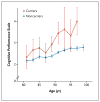Variant of TREM2 associated with the risk of Alzheimer's disease
- PMID: 23150908
- PMCID: PMC3677583
- DOI: 10.1056/NEJMoa1211103
Variant of TREM2 associated with the risk of Alzheimer's disease
Abstract
Background: Sequence variants, including the ε4 allele of apolipoprotein E, have been associated with the risk of the common late-onset form of Alzheimer's disease. Few rare variants affecting the risk of late-onset Alzheimer's disease have been found.
Methods: We obtained the genome sequences of 2261 Icelanders and identified sequence variants that were likely to affect protein function. We imputed these variants into the genomes of patients with Alzheimer's disease and control participants and then tested for an association with Alzheimer's disease. We performed replication tests using case-control series from the United States, Norway, The Netherlands, and Germany. We also tested for a genetic association with cognitive function in a population of unaffected elderly persons.
Results: A rare missense mutation (rs75932628-T) in the gene encoding the triggering receptor expressed on myeloid cells 2 (TREM2), which was predicted to result in an R47H substitution, was found to confer a significant risk of Alzheimer's disease in Iceland (odds ratio, 2.92; 95% confidence interval [CI], 2.09 to 4.09; P=3.42×10(-10)). The mutation had a frequency of 0.46% in controls 85 years of age or older. We observed the association in additional sample sets (odds ratio, 2.90; 95% CI, 2.16 to 3.91; P=2.1×10(-12) in combined discovery and replication samples). We also found that carriers of rs75932628-T between the ages of 80 and 100 years without Alzheimer's disease had poorer cognitive function than noncarriers (P=0.003).
Conclusions: Our findings strongly implicate variant TREM2 in the pathogenesis of Alzheimer's disease. Given the reported antiinflammatory role of TREM2 in the brain, the R47H substitution may lead to an increased predisposition to Alzheimer's disease through impaired containment of inflammatory processes. (Funded by the National Institute on Aging and others.).
Figures

Comment in
-
Variant TREM2 as risk factor for Alzheimer's disease.N Engl J Med. 2013 Jan 10;368(2):182-4. doi: 10.1056/NEJMe1213157. Epub 2012 Nov 14. N Engl J Med. 2013. PMID: 23151315 No abstract available.
-
Alzheimer disease: TREM2 linked to late-onset AD.Nat Rev Neurol. 2013 Jan;9(1):5. doi: 10.1038/nrneurol.2012.254. Epub 2012 Dec 4. Nat Rev Neurol. 2013. PMID: 23208114 No abstract available.
-
TREM2: a new risk factor for Alzheimer's disease.Clin Genet. 2013 Jun;83(6):525-6. doi: 10.1111/cge.12108. Clin Genet. 2013. PMID: 23347262 No abstract available.
-
TREM2 and neurodegenerative disease.N Engl J Med. 2013 Oct 17;369(16):1568-9. doi: 10.1056/NEJMc1306509. N Engl J Med. 2013. PMID: 24131183 No abstract available.
-
TREM2 and neurodegenerative disease.N Engl J Med. 2013 Oct 17;369(16):1564-5. doi: 10.1056/NEJMc1306509. N Engl J Med. 2013. PMID: 24131184 Free PMC article. No abstract available.
-
TREM2 and neurodegenerative disease.N Engl J Med. 2013 Oct 17;369(16):1565. doi: 10.1056/NEJMc1306509. N Engl J Med. 2013. PMID: 24131185 No abstract available.
-
TREM2 and neurodegenerative disease.N Engl J Med. 2013 Oct 17;369(16):1568. doi: 10.1056/NEJMc1306509. N Engl J Med. 2013. PMID: 24131188 No abstract available.
Similar articles
-
TREM2 variants in Alzheimer's disease.N Engl J Med. 2013 Jan 10;368(2):117-27. doi: 10.1056/NEJMoa1211851. Epub 2012 Nov 14. N Engl J Med. 2013. PMID: 23150934 Free PMC article.
-
R47H Variant of TREM2 Associated With Alzheimer Disease in a Large Late-Onset Family: Clinical, Genetic, and Neuropathological Study.JAMA Neurol. 2015 Aug;72(8):920-7. doi: 10.1001/jamaneurol.2015.0979. JAMA Neurol. 2015. PMID: 26076170 Free PMC article.
-
Coding variants in TREM2 increase risk for Alzheimer's disease.Hum Mol Genet. 2014 Nov 1;23(21):5838-46. doi: 10.1093/hmg/ddu277. Epub 2014 Jun 4. Hum Mol Genet. 2014. PMID: 24899047 Free PMC article.
-
TREM2 and the neuroimmunology of Alzheimer's disease.Biochem Pharmacol. 2014 Apr 15;88(4):495-8. doi: 10.1016/j.bcp.2013.11.021. Epub 2013 Dec 16. Biochem Pharmacol. 2014. PMID: 24355566 Free PMC article. Review.
-
The role of TREM2 in Alzheimer's disease and other neurodegenerative disorders.Lancet Neurol. 2018 Aug;17(8):721-730. doi: 10.1016/S1474-4422(18)30232-1. Epub 2018 Jul 17. Lancet Neurol. 2018. PMID: 30033062 Review.
Cited by
-
Peripheral innate immunophenotype in neurodegenerative disease: blood-based profiles and links to survival.Mol Psychiatry. 2024 Oct 29. doi: 10.1038/s41380-024-02809-w. Online ahead of print. Mol Psychiatry. 2024. PMID: 39472664
-
Origins, Biology, and Diseases of Tissue Macrophages.Annu Rev Immunol. 2021 Apr 26;39:313-344. doi: 10.1146/annurev-immunol-093019-111748. Annu Rev Immunol. 2021. PMID: 33902313 Free PMC article. Review.
-
Dissecting phenotypic traits linked to human resilience to Alzheimer's pathology.Brain. 2013 Aug;136(Pt 8):2510-26. doi: 10.1093/brain/awt171. Epub 2013 Jul 3. Brain. 2013. PMID: 23824488 Free PMC article.
-
Genetic loci associated with Alzheimer's disease.Future Neurol. 2014 Mar;9(2):119-122. doi: 10.2217/fnl.14.1. Future Neurol. 2014. PMID: 25530720 Free PMC article.
-
γ-Secretase cleavage of the Alzheimer risk factor TREM2 is determined by its intrinsic structural dynamics.EMBO J. 2020 Oct 15;39(20):e104247. doi: 10.15252/embj.2019104247. Epub 2020 Aug 24. EMBO J. 2020. PMID: 32830336 Free PMC article.
References
-
- Bertram L, Lill CM, Tanzi RE. The genetics of Alzheimer disease: back to the future. Neuron. 2010;68:270–81. - PubMed
-
- Saunders AM, Strittmatter WJ, Schmechel D, et al. Association of apolipoprotein E allele epsilon 4 with late-onset familial and sporadic Alzheimer’s disease. Neurology. 1993;43:1467–72. - PubMed
Publication types
MeSH terms
Substances
Grants and funding
- U01HG004438/HG/NHGRI NIH HHS/United States
- U24 AG021886/AG/NIA NIH HHS/United States
- U01HG004610/HG/NHGRI NIH HHS/United States
- U01 HG004603/HG/NHGRI NIH HHS/United States
- U01AG006781/AG/NIA NIH HHS/United States
- P50-AG025688/AG/NIA NIH HHS/United States
- P50 AG025688/AG/NIA NIH HHS/United States
- U01 AG006781/AG/NIA NIH HHS/United States
- U01HG004603/HG/NHGRI NIH HHS/United States
- U01 HG004610/HG/NHGRI NIH HHS/United States
- U01 HG006375/HG/NHGRI NIH HHS/United States
- U01 HG004438/HG/NHGRI NIH HHS/United States
LinkOut - more resources
Full Text Sources
Other Literature Sources
Medical
